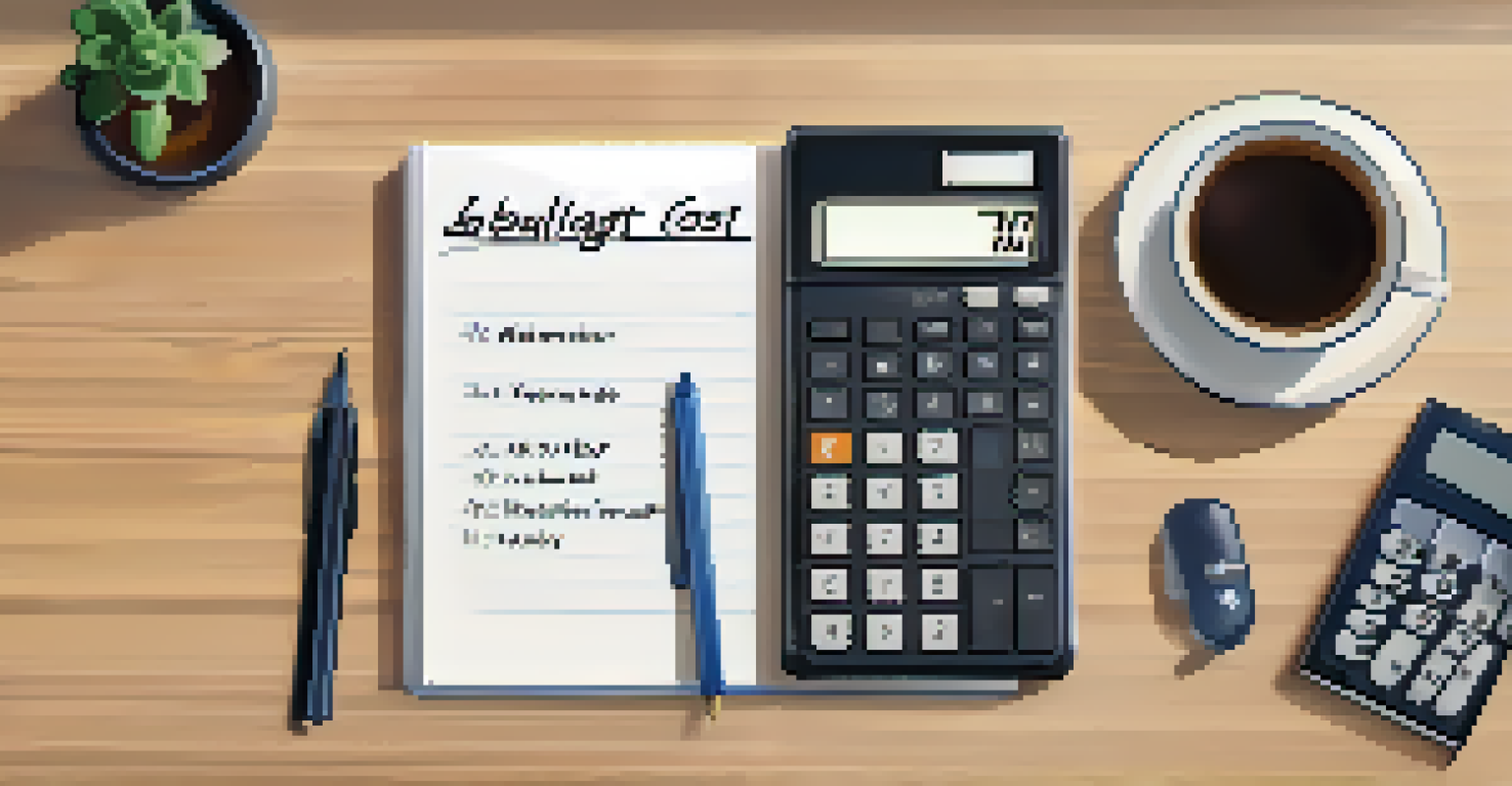Understanding Closing Costs: A Homeowner’s Perspective

What Are Closing Costs and Why Do They Matter?
Closing costs are the fees and expenses you pay when finalizing a real estate transaction. They typically range from 2% to 5% of the home's purchase price. Understanding these costs is crucial because they can significantly affect your overall budget and financial planning.
Real estate is the best investment on earth, however, when the music stops, in terms of liquidity, things can get ugly.
These costs include a variety of charges like loan origination fees, title insurance, and appraisal fees, which can add up quickly. Knowing what to expect will help you avoid any surprises on closing day. It’s also a great way to prepare for the full financial commitment of homeownership.
Ultimately, being informed about closing costs allows you to negotiate better with sellers or lenders. This knowledge empowers you to make smarter decisions, ensuring that you don't overlook important financial aspects of your home purchase.
Common Types of Closing Costs Explained
There are various types of closing costs, each serving a specific purpose in the home buying process. Common costs include lender fees, appraisal fees, and title search fees. Understanding what each cost entails can help you better prepare for the overall expenses.

For example, a loan origination fee is charged by the lender for processing the mortgage, while an appraisal fee pays for an unbiased estimate of the home's value. Title insurance protects you from potential disputes over ownership after the purchase. Knowing these details can demystify the closing process.
Understanding Closing Costs
Closing costs typically range from 2% to 5% of a home's purchase price and include various fees that can affect your overall budget.
By breaking down these costs, you can prioritize which are negotiable and which are standard. This insight helps you set realistic expectations and budget effectively, allowing you to navigate the home buying journey with confidence.
How to Estimate Your Closing Costs
Estimating your closing costs can seem daunting, but it’s a vital step in planning your home purchase. A good rule of thumb is to anticipate closing costs to be between 2% and 5% of the purchase price. For instance, on a $300,000 home, you might expect to pay between $6,000 and $15,000 in closing costs.
An investment in knowledge pays the best interest.
You can get a more precise estimate by asking your lender for a Loan Estimate (LE) form. This form provides a detailed breakdown of expected closing costs, helping you understand where your money will go. It’s essential to carefully review this document to avoid any hidden fees.
Additionally, you can use online calculators or consult with real estate professionals for further insights. The more accurately you can estimate your closing costs, the better prepared you’ll be on closing day, preventing any financial hiccups.
Who Pays Closing Costs: Buyer vs. Seller
One common question is who is responsible for paying closing costs—the buyer or the seller? Generally, buyers pay the majority of these costs, but sellers can also contribute, especially in a competitive market. This dynamic can significantly influence negotiations during the sale.
In some cases, sellers might offer to cover part of the closing costs as an incentive to attract buyers. This is often seen in markets where homes are staying on the market longer than expected. It’s important for buyers to be aware of this potential benefit.
Navigating Cost Negotiations
Buyers can negotiate closing costs with sellers and lenders, which can lead to significant savings during the home buying process.
Ultimately, the allocation of closing costs can be negotiated between both parties. Being informed and prepared to discuss these costs can lead to a more favorable agreement for everyone involved, creating a win-win situation.
Negotiating Closing Costs: Tips for Homebuyers
Negotiating closing costs can feel intimidating, but remember, it's a normal part of the home buying process. Start by reviewing your Loan Estimate carefully to identify any fees that seem excessive or unnecessary. This document can serve as a solid foundation for your negotiation.
Don’t hesitate to ask your lender or real estate agent about options for reducing fees. For instance, you might be able to negotiate lower lender fees or request that the seller covers some costs. Being proactive can make a significant difference in your final expenses.
Lastly, remember that timing can be crucial. If you’re purchasing in a buyer’s market, you may have more leverage to negotiate. Keep your options open and maintain a friendly yet assertive attitude during discussions, as this can influence how flexible the other party is.
The Role of Closing Disclosure in Home Buying
The Closing Disclosure (CD) is a critical document that outlines all of the closing costs you'll incur. You should receive this disclosure at least three days before your closing appointment, giving you time to review and ask questions. This document serves as your final checklist before you finalize the sale.
The CD breaks down all the costs in detail, showing you exactly where your money is going. It’s essential to compare this document with your Loan Estimate to ensure there are no unexpected charges. If you notice discrepancies, address them immediately with your lender.
Importance of Closing Disclosure
The Closing Disclosure outlines all closing costs and should be reviewed carefully to ensure there are no unexpected charges before finalizing the sale.
Having a clear understanding of the Closing Disclosure helps you feel more confident and informed during the closing process. It ensures that there are no surprises and that you are fully prepared for the financial commitment you are about to undertake.
Budgeting for Closing Costs: A Practical Approach
Budgeting for closing costs is an essential part of your home buying plan. Start by estimating the total amount you might owe and setting aside that amount in advance. This proactive approach can alleviate stress as you approach closing day.
Consider creating a separate savings account dedicated solely to your closing costs. This way, you can track your savings and ensure you have enough funds available when the time comes. It’s like having a financial safety net, giving you peace of mind.

Additionally, you can explore assistance programs that may help cover some of your closing costs. These programs often target first-time homebuyers and can provide valuable support, making it easier to navigate the financial aspects of purchasing a home.